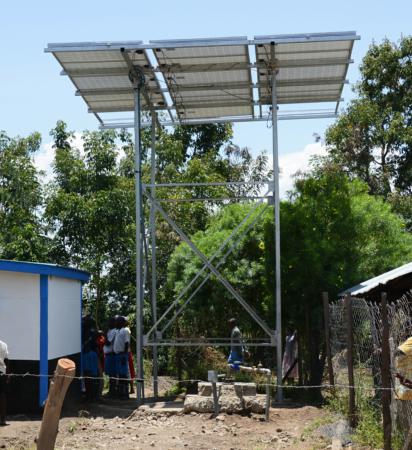Local
Boston CRS Ambassadors participate in Kenya visit
By Pilot Staff
Posted: 10/14/2016


One of the solar powered water pumps built with the assistance of CRS in Kenya. Courtesy photo
Three Catholic Relief Services Ambassadors from the Archdiocese of Boston were part of a Catholic Relief Services delegation to Kenya to visit CRS projects in Nairobi, Kisumu and Koma Bay. Kathleen M. Crawford, from Our Lady of Sorrows in Sharon, Mary Celeste Brown from Sacred Heart Parish in Roslindale and Deacon Timothy F. Donohue from St. Theresa Parish in Sherborn and Most Precious Blood Parish in Dover were part of the 10 member delegation.
CRS was created by the Catholic bishops during World War II to help care for the victims and refugees from the war. Today CRS is best known for their work during disasters such as the earthquake in Haiti and Nepal or the typhoon in the Philippines. Less well known is their work in agriculture and healthcare in 90 countries around the world touching over 100 million people a year.
The group met with CRS leaders in Nairobi and visited six active CRS projects in three different dioceses. The visits included time with the Special Olympics/ CRS Project in the Koyandware Slum in Nairobi to celebrate the accomplishments of the program for special needs and handicapped children.
CRS and Special Olympics joined forces to go door-to-door and invite the mothers and special needs children to come to meetings where they could meet each other, find friends and then get help for their children. With the help of their mothers and fathers, the children participate in games and training and have the opportunity for special health care. One child brought to the weekly meetings is now walking for the first time in his life as a result of the special therapy he received.
The delegation also traveled to the Kisumu Diocese on the coast of Lake Victoria to attend the inauguration of a new water system, a result of an IWAP (Integrated Water, Sanitation and Agriculture Project). Like many projects that CRS supports, this project was made possible through collaboration with the local Kisumu Department of Public Health through their "Communities Led Total Sanitation" approach. CRS carefully reviews proposals to find opportunities to help the greatest number of people, have the highest likelihood of adequate funding and the lowest risk of non-completion.
CRS works with local authorities and other NGOs to build creative solutions that are designed to endure. The water systems the delegation visited were engineered to meet the specific needs of the project -- with the CRS engineers matching the capacity of the well pump with the necessary water flow and the storage tank capacity. The pumps are powered by solar panels and the local residents are trained in the proper care and maintenance of the pump and solar panels.
In many cases, these water systems change the lives of the people in the villages. In this case the villagers could gather water without walking two kilometers to fill a 25 gallon container. The water was clean -- not polluted like most shallow wells and will not dry up like many wells have done during the current drought.
The delegation also visited a Prosper Project site, where CRS with other organizations weave several programs together to help the village community at several key levels.
The CRS team was called to help out in a village that was decimated by the AIDS epidemic. Many men and children died of the AIDS virus. The many AIDS orphans and widows who survived were in need of help and hope. CRS reached out to the widows, invited them to meetings and helped them to find better ways to support themselves and their children.
The delegation watched farmer group presentations, community banking meetings, and visited a farmer field site and went to visit three AIDS widows on their home farms. These programs empowered the widows to farm different more profitable crops, breed animals more efficiently with better stock and trained the women to establish a community bank right in their own village to finance their "businesses" such as farming, sewing, or running small markets. The training allowed the women to grow different drought resistant crops and to raise goats and chickens gave then improved breeding stock. The women were taught how to prepare crops for market and how to increase their yields.
CRS is funded by the Catholic parishes in the United States through collections and programs such as Rice Bowl and Feed the Hungary and through grants that provide funding for specific areas of need.